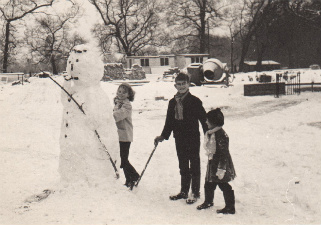Weather in times past
I drove home in a cloudburst the other day. The windscreen washers had a job to clear the screen and I could hardly see where I was going. It set me thinking about our English weather and the dreadful so called summer we have had, with the odd very warm day interspersed with days of heavy rain. Is our weather any worse than it used to be in years gone by?
As a writer of historical fiction, I could invent the weather to fit my plot but I like to stick to the facts, if I can, so whenever I come across the mention of weather in an historical record, I like to make a note of it and it seems to me, our climate has always been unpredictable. There have always been heavy snowfalls, gales, flooding and heat waves and ever since 1659, there have been weather records.
I have recently been writing about the 18th Century when the nine years from 1751 - 1760 were the wettest for nearly a hundred years and in March 1774, there was deep snow and frost and then a rapid thaw which led to extensive flooding. A gale and storm surge in 1740 inundated the Suffolk coast and carried away the last of the church at Dunwich, a town already being eroded by the sea and now completely gone. It is said you can still hear the church bells ringing when the sea is rough. In June and July 1783, a series of volcanic eruptions in Iceland sent clouds of sulphuric dust into the atmosphere resulting in a blue haze all over Europe and thousands of deaths. In 1794 a snowstorm swept across Scotland and left behind it over 1800 dead sheep, nine cattle, three horses, 45 dogs, two men and one woman beside innumerable smaller animals, all heaped together. There was snow in London in June 1791 but it soon disappeared.
In Regency times, the winter of 1813/14 was one of the coldest on record with huge snowfalls, and on the 27th December, the fog was so dense visibility was down to five yards in places and the Prince Regent on his way to St Albans to visit the Earl of Salisbury was obliged to turn back. The Frost Fair on the Thames in February 1814 was the last time the Thames froze bank to bank, although ice floes were recorded in the winter of 1894/95.
1816 was called the year without a summer, not only in England but all over the world, caused by a huge volcanic explosion in Mount Tamboura in the Dutch East Indies, which sent a dust column thousands of feet into the air. The debris, including vast quantities, of sulphur took a year to circulate, its sheer volume obliterating the sun. Without the sun temperatures dropped dramatically and there was constant rain. In the UK, crops rotted in the fields and even those that were harvested rotted in the barns. Farm labourers were put out of work and added to the unemployed soldiers returning from the war with Napoleon.
On the 28th December 1879, the Tay Bridge in Scotland was blown over in a gale while a train was crossing it and 75 lives were lost. In the winter of 1890/91 the ice was so thick, the rivers Severn and Avon could be crossed on it by ordinary road traffic.
Coming to more recent times, the wet summers of the Great War are legendary when the troops wallowed in mud; and the winter of 1939/40, the first of the Second World War, had a lot of snow followed by a glorious summer when the Battle of Britain raged over the skies of southern England. There was a heat wave in September of that year with temperatures in the 90s F.
1946/47 was one of the harshest on record causing fuel and food shortages from January to March. When the thaw came it brought rain with it which, added to the melting snow, caused widespread floods when thousands of properties were damaged. A severe gale on the night of 16th/17th April together with high river levels breached the dykes in the fens and thousands of acres of arable land were flooded. Almost the same thing happened on the night of 31st January 1953. Gales with speeds of up to 100 mph, coupled with exceptionally high tides caused major flooding on both sides of the North Sea. It was a terrifying night along the east coast of England, homes were washed away and 300 lives were lost.
1962/63 was another severe winter when it was possible to skate from Cambridge to Ely on the river and the ice was so thick on the ponds I remember a jeep being driven across a lake towing an upside-down wooden table in which several children enjoyed a ride. That December too, we had the last great smog in London caused by coal smoke and sulphur dioxide products over ten times their normal concentration and, as a result thousands died of lung problems. Since then we have had smoke free zones.
These records are grist to the mill for a writer of historical novels, but I am left wondering, is the weather any worse than it used to be? Fortunately nowadays we have weather warnings and flood defences and highly sophisticated farm machinery to mitigate the damage, though building on flood plains and covering our gardens with tarmac and concrete is not helping. All the same I think we are lucky compared with what our forebears had to put up with.
